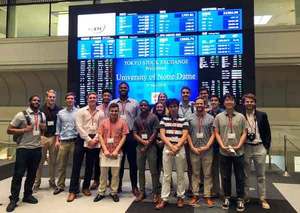Business students learn the meaning of ‘moralogy’ during summer program in Japan
Published: July 24, 2018 / Author: Jessica Temple
Even beginner business majors can answer the question, “What’s the primary objective of American business?” Answer: Maximizing returns for shareholders.
But as students in Jessica McManus Warnell’s Business and Culture in Japan course discovered, this isn’t the global standard for good business.
 Students in the Business and Culture in Japan course visited the Tokyo Stock Exchange.
Students in the Business and Culture in Japan course visited the Tokyo Stock Exchange.
“What we were hearing from the companies we visited [in Japan] was that successful business is more about societal impact and employee engagement and customer satisfaction,” McManus Warnell says. “And of course, if all of these go well, then the shareholders will also benefit.”
This approach, she adds, reflects Japanese “moralogy,” which presents the idea that business can foster a virtue ethic that then makes business better for all stakeholders — customers and clients, employees, managers and society. Engaging students with different viewpoints like this, she adds, broadens their perspective of what business can be, and prompts them to consider and seek out the best business practices.
The concentrated study abroad program, offered during the summer through the University of Notre Dame’s Mendoza College of Business, introduces undergrads to Japan’s cultural and business traditions during four campus class sessions and two weeks on-site in Tokyo.
Why Japan? “There is so much focus on globalization, and Asia is getting a lot of attention right now,” says McManus Warnell, an associate teaching professor in the College’s Management & Organization department and a faculty fellow in the Liu Institute for Asia and Asian Studies.
Notably, Tokyo now claims more Fortune 500 companies than any other major city in the world. And the commonalities between the U.S. and Japan — both democracies with capitalist economies — provide a helpful backdrop “for recognizing the similarities and differences in what we do in terms of business,” she says.
As an example, offers McManus Warnell, this year’s 17-member cohort, most of them business students, noted how moralogy echoes themes from their ethics courses at Notre Dame and aligns with Mendoza’s own mission of business for good.
During their stay, students attend classes with Japanese students and scholars at Keio University, meet with senior business executives and visit cultural heritage sites around the city. This year, the third for the course, the stops included the Tokyo Stock Exchange, the Emerging Science and Innovation Museum, and the Ministry of Agriculture, Forestry and Fisheries.
Meetings with Notre Dame alumni who work in Japan’s corporate sector capped the course experience. Among the presenters, students heard from Brandon Moore (FIN ’15) of KPMG Tokyo, who spoke about early career employees in Japan, and Tim Andree (ND ’83), executive chairman and executive vice president of the public relations/communications company, Dentsu Aegis Network, and former Notre Dame basketball standout. Andree hosted a half-day visit to Dentsu, where he outlined his career path from Notre Dame to Asia and discussed cross-cultural business management. Students took part in a class about business customs in Japan
Through class sessions, discussions and corporate presentations, the group learned how the best businesses in the U.S. and Japan grapple with the same issues: sustainability and environmental concerns; the social impact of business on employees, communities, and society; technology and innovation. But discovering what they have in common with their Japanese counterparts—a desire to “make the most of their university experience, connect with others, and find work that matters”—was just as valuable for the students, McManus Warnell says.
With so much emphasis on thinking globally, she adds, students need such immersive experiences to stimulate their interest in other parts of the world. “These experiences get them thinking about the world in a different way,” she says, “which can help them understand and realize just how interconnected we are.”




